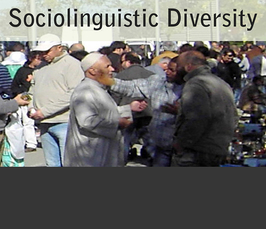"Language and Super-diversity: Explorations and interrogations"
Workshops, conferences 2013
- Start: Jun 5, 2013 09:00 AM (Local Time Germany)
- End: Jun 7, 2013 04:30 PM
- Location: University of Jyväskylä, Finland

Conference on Language and Super-diversity, Finland, 2013
For more details please contact esser(at)mmg.mpg.de.
Invited speakers:
- Michael Silverstein (University of Chicago)
- David Parkin (University of Oxford)
- Christopher Stroud (University of Western Cape)
- Sirpa Leppänen (University of Jyväskylä)
Invited round-table discussion on Language and Super-diversity:
- Jan Blommaert (University of Tilburg)
- Ben Rampton (King’s College)
- Karel Arnaut (Max Planck Institute for the Study o f Religious and Ethnic Diversity)
- Jens Normann Jørgensen (University of Copenhagen)
- Robert Moore (Penn Graduate School of Education)
-
Cecile Vigouroux (Simon Fraser University)
During the past few decades, the face of social, cultural and linguistic diversity in societies all over the world has changed radically, producing complexity of a different kind than what has traditionally been captured in the notion of multiculturalism. This ‘new’ diversity, or super-diversity (Vertovec 2007), encompasses a wide range of societal and cultural transformations that stem mainly from accelerated processes of geocultural and mediated globalization of the last two decades.
Super-diversity manifests most notably in such demographic and social changes as the tremendous increase in the categories of migrants, not only in terms of nationality, ethnicity, language and religion, but also in terms of motives, patterns and careers as migrants, processes of insertion into, settling in and interactions with the host societies. It is also witnessed in the increasing complexity of both physical and virtual spaces and their compressed and multi-scalar character. It shows in the enhanced mobility of people and the speed with which they can move between and access other places. In the same way, communication, the dissemination of information and the mediation of cultural practices and products are increasingly characterized by rapidity, simultaneity and ubiquity. Technologies of communication and information circulation offer new opportu nities for interaction in which identifications are not organized on the basis of local, ethnic or national categories only but which are characterized by translocality, connectedness and heterogeneity.
In language use, a crucial effect of super-diversity is that the language and cultural biographies and repertoires, forms of communication and interaction between individuals, groups and communities cannot be presupposed. Language uses are not necessarily tied to national or ethnic groups or to standard varieties of language. Instead, they encompass a broad field of less predictable actors, activities and creative energies. In new combinations and intertwining of stability and instability, reliance on tradition and established normative orders are tied in with situated emergent forms of practice.
To capture, describe and explain the forms, processes, practices and effects of super-diversity, sociolinguists are faced with a multi-facet ed challenge, calling forth a revision of some of their key tools – their theoretical apparata, methods of data gathering and analytic concepts (Blommaert and Rampton 2011). The aim of this international conference is to explore and interrogate the perspective offered by super-diversity, a perspective which for sociolinguistic study has tremendous heuristic potential.